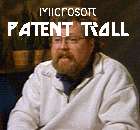
Summary: More and more scrutiny for the Microsoft cartel as lobbying, extortion, and even lawsuits by proxy become more evident
IN THE previous post we showed Microsoft's own reminder that it was lobbying for software patents in Europe.
To say more about Microsoft,
"Alcatel-Lucent Told Microsoft Damages Award May Be Reduced," says a Microsoft-friendly source in a new report which stresses that "Alcatel-Lucent’s patent-infringement jury award against Microsoft Corp. may be lowered to $26.3 million from $70 million, a federal judge said."
The
Alcatel-Lucent was covered here years ago as it was one of those cases Microsoft used to paint itself a "victim" of the patent system while continuing to attack Linux with extortion, either directly or through patent trolls. A couple of months ago someone who was evaluating
Acacia contacted us by IRC. Some investors still try to put a worth on the patent-trolling business and Dana Blankenhorn too
tries to assess their worth. "Regular readers here know," he writes, "that Interdigital (IDCC) doesn't make anything. Except money. Its patented technologies are at the heart of most major cell phones. It licenses those patents, and as the interest in software patents has risen, its stock has as well."
A favourite patent troll of Microsoft,
Intellectual Ventures, is now extorting quite hard for profit and becomes
the subject of an antitrust-related appeal. Masnick had
this to say about it:
If The DOJ Really Wants To Review Anticompetitive Patenting, Why Doesn't It Look At Intellectual Ventures?
We were just noting the oddities of Intellectual Ventures suing Motorola Mobility Inc. as MMI is likely being acquired by Google -- since Google is an IV investor, and supposedly immune from suits over IV's patents. It would seem like once a deal closes, that the lawsuit would be moot. Along those lines, the folks at M*CAM, who spend a lot of time doing detailed analysis of patent quality, have written a compelling open letter to the Justice Department. You see, the Justice Department is investigating the Motorola Mobility buy to see if it would be anti-competitive. Now, pretty much everyone (including Google) has admitted that the Motorola Mobility buy is mostly about the patents, and patents are technically a monopoly, but they're a legal monopoly. However, the pooling of patents can be anti-competitive. Either way, M*CAM can't quite figure out the reasons here, noting that vertical integration isn't seen as a problem by the Justice Department (see, Oracle, Sun)
For those who have not heard yet, Microsoft found another extortion victim. We will write about it separately because I had a post about it but lost it while editing on the Palm PDA, as usual. The key points were,
Microsoft Florian carries on boosting Microsoft's latest extortion deal (telling off Google), which targets Android and Chrome OS without mentioning any specific details. CNET also plays along with Microsoft's racketeers and the coverage of this was extensive enough, although it suffered from lack of details (by design). IBM's Rex Ballard, on behalf of himself only, writes in USENET: "It's finally here - Microsoft Linux!!!
"Yes," he writes, "Microsoft has finally found a way to use it's monopoly power to extort more $billions from software it didn't develop, doesn't own, and has probably stolen.
"That's right boys and girls who spend the last 20 years supporting Linux in hopes of breaking the Microsoft Desktop Monopoly - Microsoft has figured out that it can threaten to sue smaller companies for patent infringement. Never mind that Microsoft's patents are on code that was released as GPL and LGPL code years and even decades before Microsoft ever filed a patent, or that several patents were filed on code Microsoft never published and protected with nondisclosure and trade secrets protections.
"Apparently, one of the 10 people who has ever seen the Microsoft code, who has worked for Microsoft and were never fired, somehow took the patented code and contributed it to Linux years BEFORE Microsoft even FILED their patents.
"Of course, Microsoft has a $2 billion a year legal budget, and if Microsoft files lawsuits against smaller companies like Quanta, the legal mess alone could drain their budgets, profits and any cash reserves in motions and other forms of attrition.
"I'm surprised that Google hasn't just told it's licensees that they would indemnify them against any Microsoft Patents. That would be two giants and in that scenario, Microsoft has far more to lose, because they have far more to keep hidden."
⬆

